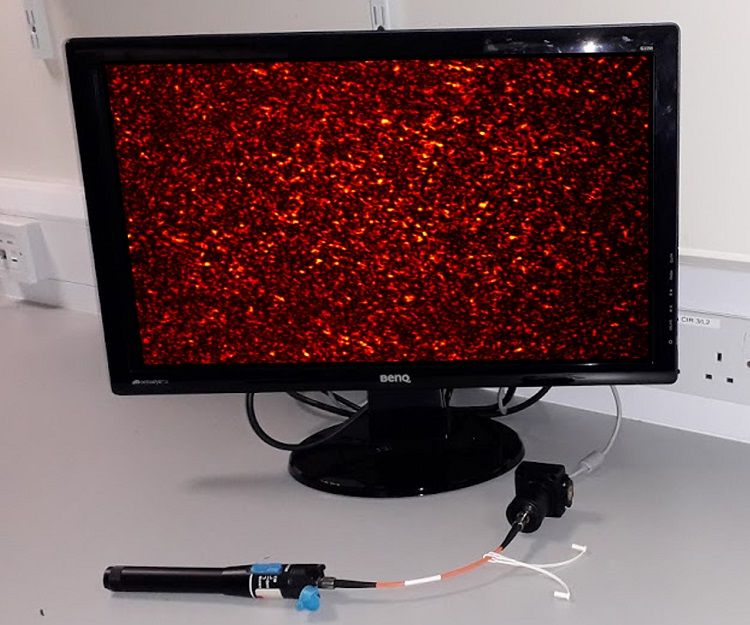Scoliosis can now be treated with this minimally invasive surgery.
Category: innovation – Page 217

Who invented the dishwasher, windshield wiper, caller ID? Women created these 50 inventions
On May 5, 1809, Mary Kies became the first woman to receive a patent in the United States. (It was for her technique of weaving straw with silk.)
Of course, women inventors existed before this time, but the property laws in many states made it illegal for women to own property on their own. This led some women to apply for patents in their husbands’ names if they decided to apply at all.
As of last year, only 10 percent of U.S. patent holders were women, although women account for half of doctoral degrees in science and engineering. This disparity is due in part to the U.S. Patent and Trademark Office being more likely to reject patents with women as sole applicants.

Don’t adjust your sets – new research could revolutionise fiber-optic communications
A team of researchers from the University of St Andrews (St Andrews, Scotland) has achieved a breakthrough in the measurement of lasers that they say could revolutionize the future of fiber-optic communications. They also say the wavelength meter (or wavemeter) will boost optical and quantum sensing technology, enhance the performance of next-generation sensors, and expand the information-carrying capacity of fiber-optic networks.
A team of researchers from the University of St Andrews has achieved a breakthrough in the measurement of lasers which could revolutionise the future of fiber-optic communications.
The new research, published in Optics Letters (Wednesday 6 March), reveals the team of scientists has developed a low-cost and highly-sensitive device capable of measuring the wavelength of light with unprecedented accuracy.
The wavemeter development will boost optical and quantum sensing technology, enhancing the performance of next generation sensors and the information-carrying capacity of fiber-optic communications networks.

Breakthrough process welds metal and glass together using ultrafast lasers
Traditionally, welding has been limited to materials that share similar properties, so it’s tough to make even aluminum and steel join forces. But now, scientists from Heriot-Watt University are claiming a breakthrough method that can weld together materials as different as glass and metal, thanks to ultrafast laser pulses.

116 Of The Oldest Color Photos Showing What The World Looked Like 100 Years Ago
When you think of old photographs, you naturally think in terms of black and white, but as you can see from these stunning photographs from the turn of the 20th century, color photography has been around for a lot longer than you think.
Before 1907, if you wanted a color photograph then you (well, a professional colorist) basically had to color it in using different dyes and pigments, but two French brothers called Auguste and Louis Lumière changed all that with a game-changing process that they called the Autochrome Lumière. Using dyed grains of potato starch and light-sensitive emulsion, they were able to produce vibrant photographs without the need for additional colorization. Despite being difficult to manufacture and also somewhat expensive, the process was very popular among amateur photographers and one of the world’s first books of color photography was published using the Autochrome Lumière technique.
The brothers revolutionized the world of color photography until Kodak took things to a whole new level with the invention of Kodachrome film in 1935, a lighter and more convenient alternative that quickly made the Autochrome Lumière obsolete (although its popularity continued in France up until the 1950s). Kodachrome was also eventually overtaken by the rise of digital photography (Kodak stopped manufacturing Kodachrome in 2009), which is now by far the world’s most popular way to take pictures, but modern advances in photographic technology wouldn’t have been possible without the hard work of early pioneers like Auguste and Louis Lumière. Scroll down for a collection of stunning century-old color photographs using their groundbreaking technique.

These are the 20 most innovative countries in Europe
Published with the aim of highlighting to EU member countries the areas which they ought to focus on improving, the European Commission has released its 2018 ranking on innovation in Europe.
The commissioner for Internal Market, Industry, Entrepreneurship and SMEs Elzbieta Biénkowska commented on the rankings in a European Commission press release, saying: “The 2018 scoreboard shows again that Europe has a wealth of talent and entrepreneurial spirit, but we must do better at turning this excellence into success.”
Although Europe has managed to maintain its footing in terms of world innovation, China is fast closing the gap, with its rate of innovation growing up to three times faster than that of the EU. To produce the ranking, the Commission gives points based on a number of factors — including whether the country has an “innovation-friendly environment”, a country’s human capital, public expenditure on innovation and related investments made by private companies.

Stem cell heart patches ‘could save lives’
A medical breakthrough by scientists at Imperial College London could save thousands of heart patient’s lives.
Working with the British Heart Foundation, they have developed beating heart patches which could restore the muscle strength lost after a heart attack.
Claire-Marie Berouche has third-stage heart failure and she’s hoping the patch will change her quality of life.

10 Breakthrough Technologies 2019, curated by Bill Gates
We asked Gates to choose this year’s list of inventions that will change the world for the better.
